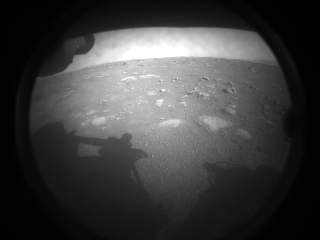Yup. A uniquely American solution. Reminds me of the (probably apocryphal) story of how NASA spent a fortune developing a pen which would write in zero-gravity, in freezing temperatures, in a vacuum, etc. Presented with the same problem, the Russians just used a pencil.
I had the same thought. They used terrain for the final adjustments, and apparently the lander radioed its touchdown location to the MRO. They made a big deal about knowing exactly where it was. My first thought was whether they used terrain or a coordinate system for that positioning. And if the latter, what do they use for the prime meridian? That's the curse of having navigation experience. You can never get it out of your mind.
And yes, the PERV was just crashed a safe distance away. There was some talk about picking up the seismic activity from the landing on the sensors on another lander already there. Probably not the crash, but maybe the rocket vibrations.



